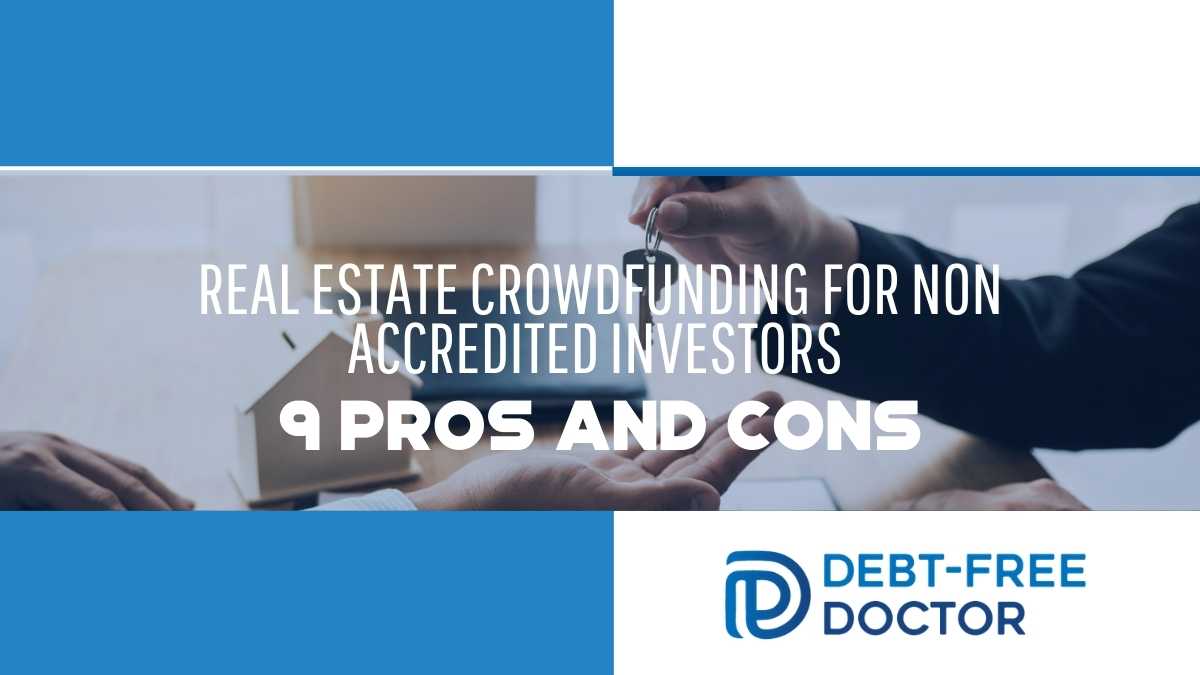Real Estate Crowdfunding For Non Accredited Investors
I get quite a few questions and emails from other doctors regarding investing. One of the most commonly asked question is, “Hey Jeff, what do you recommend I invest in to build wealth so I don’t have to see patients forever?”
I take the same approach Dave Ramsey does when one of his callers asks a question by telling them “what I would do” in that particular situation.
For investment questions, I simply tell them what I’ve personally done to build wealth by following these three steps:
- spend less than you earn
- automate investments
- invest in index funds and real estate
The major push back I get when I give them this short “to do” list involves real estate. I get it. We’re busy seeing patients all day so who has time to manage property on the side, right?
There are a handful of busy professionals that can balance both working their day jobs and managing property. As a matter of fact, my neighbor is one of them. He runs a busy occupational therapy clinic and also manages 7-8 single family homes in our neighborhood.
But not everyone wants the responsibilities of being a landlord. I don’t at this point in my career.
The good news is you can now reap the benefits of investing in real estate while doing it passively.
So in essence, you can have your cake and eat it too. I’m glad ’cause I like sweets!
Let’s get into how we can do it….
Background
In 2012, The Jumpstart Our Business Startups (JOBS) Act was passed to help spur the economy by making it easier for small businesses to raise capital.
This helped pave the way to allow individuals to invest in real estate without the need to actually manage any property.
This act specifically permitted non-accredited investors to participate in these types of investments as most equity investments are only open to accredited investors (see below for definition).
This means that people could start investing in real estate on a much smaller scale thus making these deals available to the majority of the population.
On a recent Listen Money Matters Podcast episode, they discussed investing in alternative investments via a Self Directed IRA (SDIRA). Specifically using it to invest in real estate crowdfunding deals.
On the show, Eric Satz of Alto, made a great point at what it meant to investors that the JOBS Act passed. The government realized that at that time, only the wealthy (accredited) investors could invest in these types of deals.
Now as you know, the government is all about putting everyone on a level playing field so by passing this Act, it allowed the majority of investors the same opportunity to invest in these deals, and get the same high returns except on a smaller scale.
In a nutshell, they didn’t only want the wealthy folks benefiting, they wanted everyone to.
This is great for those that only want to start off investing a few thousand dollars to get their feet wet.
This is what I did on my first crowdfunding deals.
The Difference Between An Accredited and Non-Accredited Investors
To qualify as an accredited investor, the Securities and Exchange Commission (SEC) states that you must meet one of the following criteria:
- earned income that exceeded $200,000 (or $300,000 together with a spouse) in each of the prior two years, and expects the same for the current year, OR
- has a net worth over $1 million, either alone or together with a spouse (excluding the value of the person’s primary residence).
Non-Accredited Investor
As you can imagine, the majority of the investing population is made up of non-accredited investors.
This group is anyone who does not meet the requirements of an accredited investor, as defined by the SEC. They’re also known as a retail investor.
This includes any investor whose net worth is less than $1 million and has an income under $200,000 individually (or $300,000 with a spouse).
Remember, the JOBS Act? The SEC actually updated it in 2015 which opened up many opportunities for real estate crowdfunding for non accredited investors.
Many of these available offerings are in the form of REIT or eREIT investments.
One of our favorite shows to watch as a family is Shark Tank. If you’ve watched the show then you’ve probably heard them discuss crowdfunding in some form or fashion.
Many times the people pitching to the “sharks” have raised money through various online crowdfunding sites such as Kickstarter.
These sites are where people can view the different projects and provide “starter” money.
Basically, this money helps them to get their projects up and going and also is a proof of concept that their idea (invention) could possibly work.
Real estate also has this type of crowdfunding which allows people to pool their money into specific projects.
Most of these platforms are online.
Not only does this help out the investors by using the collective money to do more than each person can do alone, but it also assists the business or developer raise funds for their project.
Some of these projects include:
- single family homes
- apartment complexes
- storage units
- retail centers
The minimum investment for real estate crowdfunding ranges from as low as $500 up to $20,000 or more.
Most projects are advertised on different online crowdfunding platforms that do much of the due diligence to help sort through the bad deals. While you do have to pay a bit extra in fees for this extra layer of work, it could mean the difference in investing in real estate without have to be an expert.
As with most types of investments, real estate crowdfunding for non accredited investors comes with both advantages and disadvantages. Let’s take a look at both….
Pros and Cons
Pros
1) Low investment minimums
Probably the biggest advantage given to real estate crowdfunding for non accredited investors is that most of these online platforms allow extremely low investment minimums.
These vary from site to site but allows investors to start dabbling in real estate investing for only a couple of hundred dollars.
2) Allows for diversification
Being able to diversify investments was the main reason I started investing in real estate to begin with. And now with the lower entry, non-accredited investors have more options in order to avoid having to put all of their eggs in one basket thus reducing overall risk.
3) Tax breaks
Most people, especially high-income professionals, are ALWAYS looking for ways to lower their tax bills. I’m NOT a CPA but would encourage you to speak with one regarding certain tax breaks that are allowed by investing in these types of deals. Sometimes, you’re able to take advantage of the depreciation of the properties.
4) Higher returns
Most online real estate crowdfunding platforms are able to give investors access to potentially higher returns than you can find if invested in only stocks, bonds or mutual funds.
You can expect to get somewhere in the range of 8-15+%. Not bad for not having to do too much work.
5) Passive income
Another reason I started investing in real estate was to create an additional stream of passive income. Too many people rely on their job “only” to create income.
What happens if something happens to either the job or their health? Money would stop flowing in. Not good!
I realize that with some of these deals, the passive income will start off being small in value, but it does help create a lot of potential down the road.
Now let’s shift gears and get into the disadvantages real estate crowdfunding for non accredited investors can have.
Cons
1) Crowdfunding platform risk
You’ve probably heard that one of the major online crowdfunding platforms, RealtyShares, went under. I think this surprised people as they were a major player in the game up until their demise.
But whenever you invest, you’re investing in physical property and NOT the crowdfunding platform.
2) Illiquidity
Usually your funds are locked in for a certain period of time that’s usually disclosed on the investment when being advertised.
For instance, one deal that I did with Patch of Land involved a debt deal that paid 11% over a 12 month period. So during that time frame, I didn’t have access to the money originally invested.
3) Additional tax filings
Even though possibly getting a tax reduction is one of the advantages in investing, it does mean that there will be more tax filings for you as well. What this means is it could be more work for your CPA which could cause your bill to increase.
4) Lack of a long track record
Per the JOBS Act, real estate crowdfunding only started back in 2012. Some of the platforms that started at that time are no longer with us. Also, each year, there’s new platforms developing.
So even though the potential for higher returns exists, there’s just not that much history with these companies.
Examples
There are numerous crowdfunding platforms out there such as FundRise and Diversify Fund.
DiversifyFund is a great crowdfunding platform for non-accredited investors as their minimum to invest is only $500.
They offer investors multiple different eREITs (Real Estate Investment Trusts) that allow for an ideal level of diversification.
Summary
One of the BEST ways to grow truly wealthy is through real estate investing. Up until a few short years ago, only accredited investors were able to reap the benefits of passively investing via crowdfunding.
Now that the JOBS Act was passed, it’s made multiple offerings available for non-accredited investors as well.



